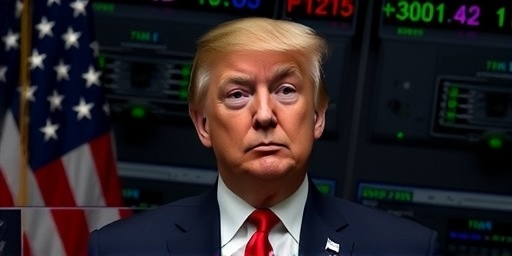In a bold move to safeguard American technological supremacy, President Donald Trump has declared that Nvidia’s latest Blackwell AI chips must be reserved solely for U.S. companies, citing escalating national security risks from global tech rivalries. Speaking at a White House press briefing on artificial intelligence advancements, Trump emphasized the need to prevent foreign entities from accessing these cutting-edge processors, which power the most sophisticated AI systems on the planet.
- Trump’s Directive Targets Nvidia’s Blackwell Platform for American Innovation
- Nvidia’s Blackwell Chips Fuel AI Revolution with Unmatched Efficiency
- National Security Concerns Drive Trump’s Stance on AI Chip Exports
- Tech Giants and Experts React to Trump’s AI Chip Reservation Plan
- Future Ramifications: Reshaping Global AI Landscape and U.S. Tech Policy
The announcement comes amid heightened tensions in the semiconductor industry, where Nvidia’s dominance in AI chips has positioned the company as a pivotal player in the global race for technological edge. Trump‘s directive underscores a broader strategy to protect U.S. interests in the face of competition from nations like China, which have been aggressively pursuing AI capabilities.
Trump’s Directive Targets Nvidia’s Blackwell Platform for American Innovation
President Trump’s push for exclusive U.S. access to Nvidia’s Blackwell AI chips was articulated during a high-stakes discussion on technology policy. ‘These chips are the future of our economy and our defense,’ Trump stated, according to White House transcripts. ‘We can’t let them fall into the wrong hands. Nvidia’s Blackwell series represents a leap in AI processing power, capable of handling trillions of parameters for machine learning models that could redefine industries from healthcare to autonomous vehicles.’
The Blackwell platform, unveiled by Nvidia earlier this year, boasts unprecedented performance metrics. According to Nvidia’s official specifications, the B200 GPU variant delivers up to 20 petaflops of AI compute performance, a staggering fivefold increase over its predecessors in the Hopper lineup. This makes it ideal for training large language models and generative AI applications, which are increasingly vital for national security applications such as cybersecurity threat detection and intelligence analysis.
Trump’s proposal builds on existing export controls imposed by the Biden administration on advanced semiconductors to China, but it escalates the rhetoric by calling for a domestic reservation policy. Experts note that while Nvidia has complied with U.S. export restrictions, the company’s global supply chain remains intertwined with international partners, raising questions about enforcement. ‘This is about prioritizing American jobs and innovation,’ Trump added, highlighting how restricting access could funnel investments back into U.S.-based research and development.
The statement has already sparked discussions in Congress, where bipartisan support for strengthening semiconductor supply chains is evident. The CHIPS and Science Act of 2022, which allocated $52 billion for domestic chip manufacturing, could see amendments to align with Trump’s vision, potentially directing subsidies toward Nvidia and its U.S. partners like Intel and AMD.
Nvidia’s Blackwell Chips Fuel AI Revolution with Unmatched Efficiency
At the heart of Trump’s advocacy lies Nvidia’s Blackwell architecture, a technological marvel designed to accelerate the AI boom. Named after mathematician David Blackwell, the platform integrates advanced features like the Transformer Engine for optimized AI workloads and NVLink interconnects for seamless multi-GPU scaling. Nvidia CEO Jensen Huang described it as ‘the engine of the AI industrial revolution’ during the product’s launch at GTC 2024, emphasizing its role in enabling real-time AI inference at scales previously unimaginable.
Key statistics underscore Blackwell’s prowess: it achieves 30 times the performance of Nvidia’s A100 chips in certain AI training tasks, while consuming 25% less energy—a critical factor as data centers worldwide grapple with power demands. For instance, training a model like GPT-4 could be expedited from weeks to days, potentially saving companies millions in operational costs. In the context of national security, these chips could enhance U.S. military simulations, predictive analytics for geopolitical threats, and even AI-driven drone swarms.
However, Nvidia’s position is delicate. The company, headquartered in Santa Clara, California, derives a significant portion of its revenue—over 40% in recent quarters—from international markets, including sales to allies like Taiwan and South Korea. Trump’s call for U.S.-only access could disrupt this balance, prompting Nvidia to invest heavily in domestic fabs. Reports from Bloomberg indicate that Nvidia is already expanding U.S. production through partnerships with TSMC’s Arizona facility, aiming to produce Blackwell chips stateside by 2025.
Industry analysts, such as those from Gartner, predict that the AI chip market will surpass $100 billion by 2027, with Nvidia holding a 80-90% share. Trump’s intervention could reshape this landscape, ensuring that U.S. firms like Google, Microsoft, and OpenAI maintain their lead without foreign competitors catching up via smuggled or licensed technology.
National Security Concerns Drive Trump’s Stance on AI Chip Exports
The national security dimension of Trump’s proposal cannot be overstated, as AI chips like Nvidia’s Blackwell are seen as strategic assets akin to nuclear technology in the digital age. U.S. intelligence reports, including those from the Director of National Intelligence’s annual threat assessment, warn that adversaries could leverage advanced AI for cyber warfare, disinformation campaigns, and autonomous weapons development. ‘Allowing unrestricted access to these chips is like handing over the keys to our digital fortress,’ said a senior Pentagon official speaking anonymously to Reuters.
Recent incidents amplify these fears. In 2023, the U.S. Department of Commerce blacklisted several Chinese firms for attempting to acquire Nvidia’s A100 and H100 chips through third-party channels, violating export controls. Trump’s policy aims to preempt such circumventions by reserving the even more powerful Blackwell series domestically. This aligns with the National Security Strategy’s emphasis on securing critical technologies, where AI is listed as a top priority alongside quantum computing and biotechnology.
Statistics from the Semiconductor Industry Association reveal that China currently produces only 16% of the world’s advanced chips, far behind Taiwan’s 92% for sub-10nm nodes. Yet, Beijing’s ‘Made in China 2025’ initiative has poured $150 billion into semiconductors, fostering homegrown alternatives like Huawei’s Ascend processors. Trump’s directive could widen this gap, compelling the U.S. to double down on initiatives like the $6.6 billion grant to Intel for new fabs in Ohio and Arizona.
Critics, including some libertarian-leaning policymakers, argue that overregulation might stifle innovation and raise costs for American consumers. A study by the Information Technology and Innovation Foundation estimates that export restrictions could increase AI development expenses by 15-20% in the short term, though long-term security benefits might outweigh these drawbacks.
Tech Giants and Experts React to Trump’s AI Chip Reservation Plan
Reactions to Trump’s announcement have been swift and varied across the technology sector. Nvidia itself has remained cautiously supportive, with a spokesperson stating, ‘We are committed to complying with all U.S. regulations while advancing AI innovation for the benefit of American leadership.’ In a CNBC interview, Jensen Huang hinted at the challenges: ‘Balancing global collaboration with national priorities is key to sustainable growth.’
Major U.S. tech firms stand to gain the most. Microsoft, a key Nvidia customer through its Azure cloud platform, praised the move as ‘essential for maintaining ethical AI development under U.S. oversight.’ Similarly, OpenAI’s CEO Sam Altman tweeted, ‘Prioritizing domestic access to advanced hardware will accelerate safe AI progress and protect against misuse.’ These endorsements reflect the industry’s reliance on Nvidia’s AI chips, which powered over 70% of the top supercomputers on the TOP500 list as of June 2024.
International voices, however, express concern. The European Union’s tech commissioner warned that such policies could fragment the global semiconductor ecosystem, potentially leading to retaliatory measures. In Asia, Taiwan’s TSMC, Nvidia’s primary foundry partner, faces added pressure as it navigates U.S.-China tensions. Market analysts from Morgan Stanley project a 10-15% dip in Nvidia’s stock if export restrictions tighten further, though shares rose 2% post-announcement on optimism for U.S. subsidies.
Academic experts weigh in on the broader implications. Dr. Fei-Fei Li, a Stanford AI pioneer, noted in a Wired op-ed, ‘While national security is paramount, we must ensure that reserving technology doesn’t hinder global collaboration on pressing issues like climate modeling.’ This sentiment echoes calls for a balanced approach, perhaps through allied-sharing frameworks like the Quad alliance.
Future Ramifications: Reshaping Global AI Landscape and U.S. Tech Policy
Looking ahead, Trump’s push for U.S.-only Nvidia AI chips could herald a new era in technology governance, with ripple effects on international trade and innovation pipelines. Policymakers in Washington are already drafting legislation to codify these restrictions, potentially integrating them into the upcoming National AI Initiative Act. This could include tax incentives for domestic AI chip production, aiming to create 100,000 high-tech jobs by 2030, per projections from the U.S. Chamber of Commerce.
On the global stage, the policy might intensify the U.S.-China tech decoupling, prompting Beijing to accelerate its own AI chip programs. Companies like Alibaba and Baidu are investing billions in alternatives, but analysts from IDC forecast that without access to Blackwell-level hardware, China’s AI market growth could lag by 20-30% over the next five years. For Nvidia, adaptation means pivoting toward U.S.-centric supply chains, possibly collaborating with emerging players like Cerebras and Graphcore to diversify beyond GPUs.
In terms of national security, enhanced domestic control over AI chips could fortify U.S. defenses against emerging threats, such as AI-augmented hacking or deepfake operations. The Department of Defense’s $1.8 billion AI budget for 2025 includes provisions for procuring Blackwell systems, signaling military adoption. Yet, ethical considerations loom large—ensuring that reserved technology promotes democratic values rather than authoritarian control.
Ultimately, this initiative positions the U.S. to lead the AI revolution on its own terms, fostering a secure ecosystem where technology serves national interests. As Trump concluded in his briefing, ‘We’re not just building chips; we’re building the future of America.’ With stakeholders from Silicon Valley to Capitol Hill mobilizing, the coming months will determine how this vision translates into policy reality, potentially redefining the boundaries of tech competition worldwide.








